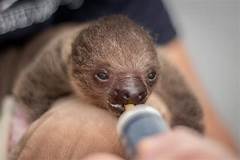Do Sloths Make Good Pets?
Sloths are unique and fascinating creatures that have captured the hearts of many people around the world. Their slow-paced, laid-back lifestyle and adorable appearance have made them popular subjects of social media posts and videos. However, before considering a sloth as a pet, it's important to understand their specific needs and behaviors to determine if they are suitable companions for your lifestyle.

The Appeal of Sloths as Pets
1. Unique Appearance: Sloths have a distinctive appearance that sets them apart from other animals. Their shaggy fur, long limbs, and slow, deliberate movements make them visually appealing and captivating.
2. Gentle Nature: Sloths are generally considered to be gentle and docile creatures. They are not known for aggression or destructive behaviors, making them seem like potential low-maintenance pets.
3. Slow-Paced Lifestyle: The slow and relaxed lifestyle of sloths may appeal to those seeking a calm and laid-back pet. Their leisurely movements and tendency to spend hours hanging upside down can provide a sense of tranquility and peace.
The Challenges of Owning a Sloth as a Pet
1. Specialized Diet: Sloths have a specialized diet consisting primarily of leaves, fruits, and vegetables. This can be challenging to replicate in captivity, as the specific types of plants and leaves they consume may not be readily available. Failure to provide the proper diet can lead to health problems.
2. Habitat and Environment: Sloths require a large, tree-filled enclosure that mimics their natural habitat. This can be difficult to provide in a home environment, especially if you live in an urban or suburban area. Lack of adequate space and the right environment can lead to stress, anxiety, and health issues for the sloth.
3. Veterinary Care: Finding qualified veterinarians with experience in caring for sloths can be challenging. Due to their unique physiology and specialized needs, sloths require specialized veterinary care, which may not be easily accessible in all locations.
Ethical Concerns
1. Conservation Status: Some species of sloths, such as the pygmy three-toed sloth, are listed as vulnerable or endangered by the International Union for Conservation of Nature (IUCN). Taking sloths out of their natural habitats for the pet trade can contribute to the decline of wild populations.
2. Illegal Pet Trade: Sloths are often illegally trafficked and sold as exotic pets. This illegal trade is a major threat to sloth populations, as it involves the removal of individuals from the wild and can result in poor living conditions and improper care.
Conclusion
While sloths may seem like appealing and unusual pets due to their unique appearance and gentle nature, it is important to carefully consider the challenges, ethical concerns, and specific needs of these animals before making a decision. Providing proper care for a sloth requires a significant commitment of time, resources, and specialized knowledge. It is essential to extensively research and consult with experts before deciding whether a sloth is the right pet for you.
Declaration: All article resources on this website, unless otherwise specified or labeled, are collected from online resources. If the content on this website infringes on the legitimate rights and interests of the original author, you can contact this website to delete it.




